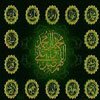How the Holy Prophet (S.A.W.) Send Salutations to Ahl al-Bayt (A.S.)

- Publication date: 2014-04-09 22:09:18
- Number of views: 343
How the Holy Prophet (S.A.W.) Send Salutations to Ahl al-Bayt (A.S.)
Abu al-Hamra, the retainer of the Holy Prophet (S.A.W.): When dawn broke, the Holy Prophet (S.A.W.) would pass by the house of Ali (A.S.) and Fatima (A.S.) and say: Greetings to you, O Ahl al-Bayt; prayer, prayer: "Verily, Allah intends to keep off from you (every kind of) uncleanness, O you the people of the house, and purify you (with) a thorough purification".
Al-Imam Ali (A.S.): The Messenger of Allah (S.A.W.) would come to us every morning and say: May God's mercy be upon you, it is time for prayers". "Verily, Allah intends to keep off from you (every kind of) uncleanness, O you the people of the house, and purify you (with) a thorough purification".
Al-Imam al-Sadiq (A.S.): Quoted his father, on the authority of his father, on the authority of his grandfather Zayn al-Abidin, on the authority of al-Hasan (A.S.) who said in his argument with Muawiyya during the peace deal: After that (the revelation of the ayah of Tathir) The Holy Prophet (S.A.W.) till he was alive would come to us at dawn and say: May God's Mercy be on you, it is time for prayer. "Verily, Allah intends to keep off from you (every kind of) uncleanness, O You the people of the house, and purify you (with) a thorough purification".
A Research on Salutation (Taslim) Hadith (An explanation)
Great traditionists of the world of Islam have narrated in different ways from Ahl al-Bayt(A.S.) and great companions like Abu Said al-Khudri, Anas ibn Malik, Abd Allah ibn al-Abbas, Abul Hamra' and others. Accordingly, the event itself is genuine and certain. As for the number of traditions in this regard, however, three groups are distinguished: First group: The traditions which imply that whenever the Holy Prophet of Islam(S.A.W.) wanted to go the mosque for morning prayers, he would go to Ali(A.S.) and Fatima's (A.S.) house and call them to prayers by salutation and reciting the ayah of Tathir.
Second group: The traditions according to which the narrator has personally seen the above mentioned event. Third group: The traditions which apparently denote that the event had not happened every day and that they differ with each other and with the first group of hadith in the number of days.
The first and the second groups have no incompatibility with each other and, accordingly, it becomes obvious that in the third group, the narrators have related their own observations which are strengthened by validity-provided that they are all flawless in origin and free from any interpolation.
Thus, to sum up the present chapter, after the revelation of the ayah of Tathir the Holy Prophet of Islam (S.A.W.) would - in order to clarify the meaning of Ahlal-Bayt in the ayah of Tathir and that of Ahlak in the ayah: "Enjoin prayer on your people" (20:132) - go to Ali (A.S.) and Fatima's (A.S.) doorstep at morning prayer time every day and call them to prayer by salutation and reciting the ayah Tathir.
All the hadiths mentioning a certain number [of days] in relating this event represent the narrator's observation and no exclusivity is understood; however some Hadiths imply that the Holy Prophet's(S.A.W.) action has been taken after the revelation of the ayah, "Enjoin prayer on your people".
Abu Said al-Khudri: When the verse, "Enjoin prayer on your people" was revealed, the Holy Prophet (S.A.W.) would go to Ali's (A.S.) house every morning for eight months and say: May God's Mercy be on you, it is time to perform, prayer "Verily, Allah intends to keep off from you (every kind of) uncleanness, O you the people of the house, and purify you (with) a thorough purification"
Allamah Tabataba'i (R.A.) commented on Abu Said's narration as follows: The tradition implies that this ayah was revealed in Madinah and as far as I remember nobody has objected to this view yet. However it may mean that to act as commanded by this ayah, the Holy Prophet (S.A.W.) would go to Ali's house in Madinah, even though it had been revealed in Makkah, which is improbable.
Source:
The Image of Ahl al-Bayt (A.S.) in The Qur'an and Hadith
By: Muhammadi Rayshahri
